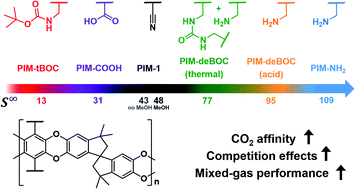Sorption-enhanced mixed-gas transport in amine functionalized polymers of intrinsic microporosity (PIMs)†
Abstract
Pure-gas transport performance rarely matches mixed-gas performance for industrially relevant membrane applications. While significant effort has focused on studying the adverse effects of plasticization, an additional phenomenon known as competitive sorption can be used to improve performance, resulting in mixed-gas permselectivities that far exceed pure-gas predictions. Such findings are rare, but recent synthetic discoveries of functional polymers of intrinsic microporosity (PIMs) now provide a platform to investigate if competitive sorption effects can improve separation performance in complex mixtures by offsetting the adverse effects of plasticization. In this work, we report high-pressure and mixed-gas transport properties for six PIMs with identical benzodioxane backbones and a diverse set of backbone functionalities. Low-pressure mixed-gas tests revealed a relationship between CO2 sorption affinity of the PIMs and improvements in CO2/CH4 and CO2/N2 mixed-gas permselectivity compared to pure-gas scenarios. The amine-functionalized PIM-1 (PIM-NH2) showed an unprecedented 140% and 250% increase in equimolar CO2/CH4 and CO2/N2 mixed-gas permselectivity, respectively, compared to that of pure-gas tests at 2 atm. Additionally, PIM-NH2 retained high CO2/CH4 mixed-gas permselectivity (>20) up to pressures of 26 atm in 50/50 CO2/CH4 mixtures, demonstrating a resistance to plasticization. Pure-gas sorption and mixed-gas permeation for the six PIMs were compared to elucidate structure–property relationships. Results demonstrate the remarkable potential of primary amine functionalization for developing highly sorption-selective and plasticization-resistant membranes for gas separations.



 Please wait while we load your content...
Please wait while we load your content...